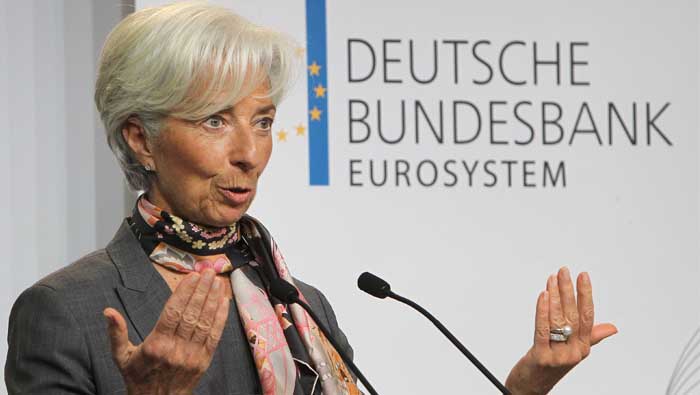
Frankfurt: Global recovery is facing growing risks, and frustration with inequality is increasing the lure of protectionism, International Monetary Fund (IMF) managing director Christine Lagarde said.
The world economy’s outlook has dimmed over the last six months, exacerbated by China’s slowdown, lower commodity prices and the risk of financial tightening in many countries, Lagarde said on Tuesday in the prepared text of a speech in Frankfurt. The expected passing of the “growth baton” from emerging markets to advanced economies hasn’t occurred, she added.
Lagarde, fresh from winning a new five-year term at the fund’s helm, used the opportunity to caution against being drawn to the kinds of forces that have fueled the populism-driven candidacies of Bernie Sanders and Donald Trump in the United States presidential election. While inequality has been declining on a global scale, the perception remains that “the cards are stacked against the common man — and woman — in favour of elites,” said Lagarde.
“To some, the answer is to look inward, to somehow unwind these linkages, to close borders and retreat into protectionism,” she said, without naming any politicians. “As history has told us — time and again — this would be a tragic course.”
Lagarde’s comments on the global economy add to signs that the IMF will downgrade its growth forecast when it releases its updated World Economic Outlook on April 12. Finance ministers and central bankers from the fund’s 188-member nations will gather later that week in Washington for the IMF’s spring meetings.
No crisis
“The good news is that the recovery continues; we have growth; we are not in a crisis,” Lagarde said. “The not-so-good news is that the recovery remains too slow, too fragile, and risks to its durability are increasing.”
Lagarde said US growth is flat due partly to the strong dollar, while low investment and high unemployment are weighing on growth in the euro zone. Growth and inflation in Japan have been weaker than expected, she added.
China’s transition to a more sustainable economic model involves slower growth, Lagarde said, adding that downturns in Brazil and Russia have been worse than expected and Middle Eastern nations have been hit hard by the decline in oil prices.
“Certainly, we have made much progress since the great financial crisis,” Lagarde said. “But because growth has been too low for too long, too many people are simply not feeling it.”
The persistent low growth can be “self-reinforcing,” because of negative effects on potential output that can be hard to reverse, she said.
Three tools
Lagarde reiterated her call for countries to use all three major tools at their disposal to boost growth: structural reforms, fiscal stimulus and monetary policy.
She said the US could boost its labor supply by increasing its earned income-tax credit and raising the federal minimum wage, while euro-area countries can help more people find jobs by improving training and job matching. Investing in infrastructure and innovation has great potential to stimulate growth, she said.
Lagarde said that the introduction of negative interest rates by the European Central Bank and Bank of Japan has been positive on the whole, despite “side effects that warrant vigilance.”